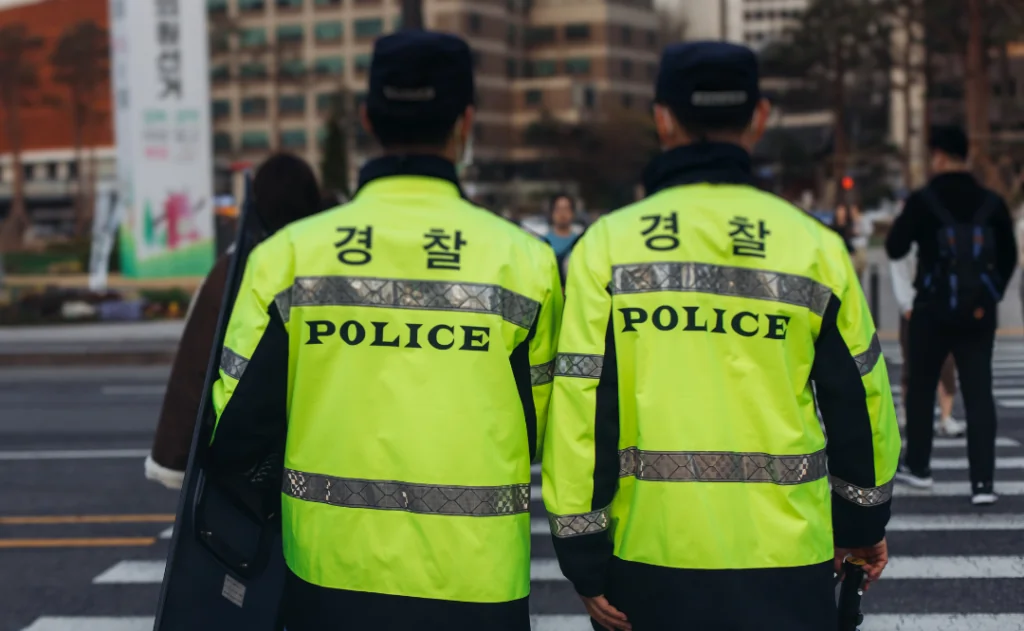Whether you’re visiting the bustling capital of Seoul, enjoying the beaches of Busan, or exploring the natural beauty of Jeju Island, there’s endless bucket list experiences to add to your South Korean itinerary. Here is what you need to know for a safe and worry-free trip.
Political Climate
Recent political unrest sparked by President Yoon Suk Yeol’s short-lived declaration of martial law on December 4, 2024 continues into the new year, with protests both for and against President Yoon’s impeachment drawing crowds. The protests are largely focused in the nation’s capital of Seoul outside the National Assembly. Despite this unfolding situation, visitors should not feel unsafe to travel and the US State Department maintains a status of “exercise normal caution” for the country.
The Korean Demilitarized Zone (DMZ) is a 155-mile wide stretch of land at the border between North Korea and South Korea, established at the end of the Korean War in 1953. This area remains tightly guarded and there are heavy consequences for unauthorized entry. However, many travelers opt to visit the DMZ with an official tour group.
Crime & Safety

It’s important to note that overall crime in South Korea is relatively low. However, as with travel to any unfamiliar destination, it is important to be aware of risks to assess the safety of a given situation.
Solo travelers should exercise reasonable caution when venturing out in popular nightlife areas such as Seoul’s Itaewon and Hongdae neighborhoods. Stay in populated public areas, do not follow anyone to a secondary location, and be wary of sharing travel plans with strangers.
An ongoing issue in South Korea is the illegal installation of spy cameras in public restrooms and private spaces, particularly those designated for women. These spy cameras are typically found in public restrooms, such as those in railway stations. According to Norton Security, there are a few on-the-fly tricks travelers can use to identify a spy camera.
Driving
South Koreans drive on the right side of the road and the driver is situated on the front left of the vehicle. The average national speed limit is 60-80 km/h (37-50mph) for single and double lane roads and100 km/h (62mph) for highways. The permissible blood alcohol concentration (BAC) for drivers 0.03%, far lower than the average 0.08% allowance in the United States.
Weather

Monsoon and typhoon season lasts roughly July through November, bringing heavy winds, rains, and a higher potential for flooding. Avoid riverbanks and other areas prone to flash floods during heavy rains and follow local emergency instructions and warnings for severe weather.
Travelers can expect to experience four distinct seasons in South Korea. The summers are hot and humid summers and the winters can reach -10°C (14° F). Check the weather before your trip and don’t forget to pack crucial items like sunscreen, bug spray, umbrellas, raincoats, hats, gloves, and winter jackets depending on the season.
Nature and Wildlife

In addition to its vibrant cities, South Korea also has several nature areas and national parks including Jeju Island, a UNESCO Global Geopark known for its volcanic landscape.
When exploring any natural area, take reasonable caution of local wildlife. Jeju Island is home to a species of venomous pit viper called the Ussuri Mamushi. These snakes do not bite unprovoked and their bite is rarely fatal with timely intervention. Increased sightings of copper sharks off the island’s coast has prompted local authorities to warn swimmers and boaters to exercise increased awareness.
One of the most popular beaches in the country, Haeundae Beach in Busan, is frequently affected by strong riptides. This past summer, the beach instituted a ban on beach tubes due to the dangerously strong currents. Check in with the status of the riptides that day before taking a dip.
Vaccinations and Medication
Along with the routine vaccinations recommended by the Center for Disease Control, travelers to South Korea should consider the following.
- Japanese Encephalitis Vaccination: For those traveling longterm to areas where Japanese Encephalitis is a known risk, such as Seoul and the surrounding areas and Geyonggi Province. Japanese Encephalitis is a mosquito-born illness.
- Typhoid Vaccination: Recommended for most travelers.
- Preventative Malaria Medication: Recommended for travelers visiting rural areas in the northern area of the country during March through December
Traveler Resources
Program these resources into your phone before arriving in South Korea.

- Seoul Emergency Ready App: An app designed to alert users to disaster alerts and other emergency reports. Available in English.
- Emergency Number: Dial “112” to be connected to police operators who can direct your emergency call. Translation services are available at this number.
- Travel Helpline & Complaint Center: Dial “1130” for tourist information from the Korean Tourism Organization. Note that this is not an emergency number. For emergencies, dial “112.”
You Might Also Like:
• SmarterStay: Spend a Long Weekend in Paris, France• What Should You Do if Your Credit Card is Lost or Stolen Abroad
• Do You Need an International Driver’s License to Rent a Car Abroad?
• How to Layer for Unpredictable Weather Without Looking Like You’re Going on an Expedition
• The 12 Best Travel Safety Products
We hand-pick everything we recommend and select items through testing and reviews. Some products are sent to us free of charge with no incentive to offer a favorable review. We offer our unbiased opinions and do not accept compensation to review products. All items are in stock and prices are accurate at the time of publication. If you buy something through our links, we may earn a commission.
Related
Top Fares From
Today's Top Travel Deals
Brought to you by ShermansTravel
Shop and Save with Country Inns...
Patricia Magaña
 Hotel & Lodging Deals
Hotel & Lodging Deals
$229 -- Chicago: Discounted Rates and...
Francesca Miele
 Hotel & Lodging Deals
$229+
Hotel & Lodging Deals
$229+
$188 -- Honolulu: Save on Oceanview...
Abigail Lamay
 Hotel & Lodging Deals
$188+
Hotel & Lodging Deals
$188+




